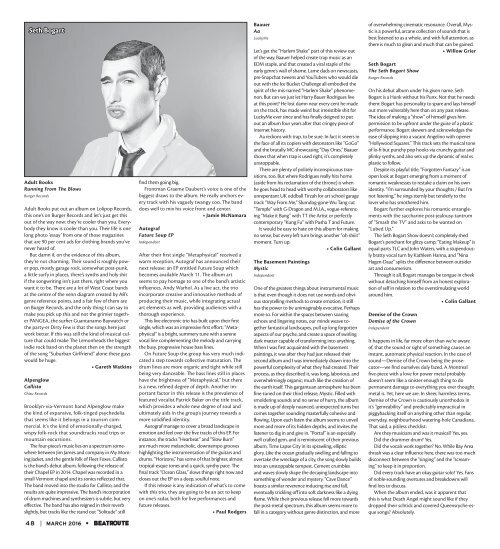BeatRoute Magazine Alberta print e-edition - March 2016
BeatRoute Magazine is a monthly arts and entertainment paper based in Western Canada with a predominant focus on music – local, independent or otherwise.
BeatRoute Magazine is a monthly arts and entertainment paper based in Western Canada with a predominant focus on music – local, independent or otherwise.
Create successful ePaper yourself
Turn your PDF publications into a flip-book with our unique Google optimized e-Paper software.
Seth Bogart<br />
Adult Books<br />
Running From The Blows<br />
Burger Records<br />
Adult Books put out an album on Lolipop Records,<br />
this one’s on Burger Records and let’s just get this<br />
out of the way now: they’re cooler than you. Everybody<br />
they know is cooler than you. Their life is one<br />
long photo ‘essay’ from one of those magazines<br />
that are 90 per cent ads for clothing brands you’ve<br />
never heard of.<br />
But damn if, on the evidence of this album,<br />
they’re not charming. Their sound is roughly power<br />
pop, mostly garage rock, somewhat post-punk,<br />
a little surfy in places, there’s synths and holy shit<br />
if the songwriting isn’t just there, right where you<br />
want it to be. There are a lot of West Coast bands<br />
at the centre of the venn diagram created by AB’s<br />
genre reference points, and a fair few of them are<br />
on Burger Records, and the only thing I can say to<br />
make you pick up this and not the grimier together<br />
PANGEA, the surfier Guantanamo Baywatch or<br />
the party-er Dirty Few is that the songs here just<br />
work better. If this was still the kind of musical culture<br />
that could make The Lemonheads the biggest<br />
indie rock band on the planet then on the strength<br />
of the song “Suburban Girlfriend” alone these guys<br />
would be huge.<br />
• Gareth Watkins<br />
Alpenglow<br />
Callisto<br />
Chizu Records<br />
Brooklyn-via-Vermont band Alpenglow make<br />
the kind of expansive, folk-tinged psychedelia<br />
that seems like it belongs in a tourism commercial.<br />
It’s the kind of emotionally-charged,<br />
wispy folk-rock that soundtracks road trips or<br />
mountain excursions.<br />
The four-piece’s music lies on a spectrum somewhere<br />
between Jim James and company in My Morning<br />
Jacket, and the gentle folk of Fleet Foxes. Callisto<br />
is the band’s debut album, following the release of<br />
their Chapel EP in 2014. Chapel was recorded in a<br />
small Vermont chapel and its sonics reflected that.<br />
The band moved into the studio for Callisto, and the<br />
results are quite impressive. The band’s incorporation<br />
of drum machines and synthesizers is subtle, but very<br />
effective. The band has also reigned in their reverb<br />
slightly, but tracks like the stand out “Solitude” still<br />
find them going big.<br />
Frontman Graeme Daubert’s voice is one of the<br />
biggest draws to the album. He really anchors every<br />
track with his vaguely twangy coo. The band<br />
does well to mix his voice front and center.<br />
• Jamie McNamara<br />
Autograf<br />
Future Soup EP<br />
Independent<br />
After their first single “Metaphysical” received a<br />
warm reception, Autograf has announced their<br />
next release: an EP entitled Future Soup which<br />
becomes available <strong>March</strong> 11. The album art<br />
seems to pay homage to one of the band’s artistic<br />
influences, Andy Warhol. As a live act, the trio<br />
incorporate creative and innovative methods of<br />
producing their music, while integrating actual<br />
art elements as well, providing audiences with a<br />
thorough experience.<br />
This live electronic trio has built upon their first<br />
single, which was an impressive first effort; “Metaphysical”<br />
is a bright, summery tune with a serene<br />
vocal line complementing the melody and carrying<br />
the busy, progressive house bass lines.<br />
On Future Soup the group has very much indicated<br />
a step towards collective maturation. The<br />
drum lines are more organic and tight while still<br />
being very danceable. The bass lines still in places<br />
have the brightness of “Metaphysical,” but there<br />
is a new, refined degree of depth. Another important<br />
factor in this release is the prevalence of<br />
featured vocalist Patrick Baker on the title track,<br />
which provides a whole new degree of soul and<br />
ultimately aids in the group’s journey towards a<br />
more solidified identity.<br />
Autograf manage to cover a broad landscape in<br />
emotion and feel over the five tracks of this EP. For<br />
instance, the tracks “Hearbeat” and “Slow Burn”<br />
are much more melancholic, downtempo grooves<br />
highlighting the instrumentation of the guitars and<br />
drums. “Horizons,” has some of that brighter, almost<br />
tropical-esque tones and a quick, synthy pace. The<br />
final track “Ocean Glass,” slows things right now and<br />
closes out the EP on a deep, soulful note.<br />
If this release is any indication of what’s to come<br />
with this trio, they are going to be an act to keep<br />
on one’s radar, both for live performances and<br />
future releases.<br />
• Paul Rodgers<br />
Baauer<br />
Aa<br />
LuckyMe<br />
Let’s get the “Harlem Shake” part of this review out<br />
of the way. Baauer helped create trap music as an<br />
EDM staple, and that created a viral staple of the<br />
early genre’s wall of shame. Lame dads on newscasts,<br />
pre-Snapchat tweens and YouTubers who would die<br />
out with the Ice Bucket Challenge all embodied the<br />
spirit of the mis-named “Harlem Shake” phenomenon.<br />
But can we just let Harry Bauer Rodrigues live<br />
at this point? He lost damn near every cent he made<br />
on the track, has made weird but irresistible shit for<br />
LuckyMe ever since and has finally deigned to put<br />
out an album four years after that cringey piece of<br />
internet history.<br />
Aa reckons with trap, to be sure. In fact it sneers in<br />
the face of all its copiers with detonators like “GoGo”<br />
and the brutally MC-showcasing “Day Ones.” Baauer<br />
shows that when trap is used right, it’s completely<br />
unstoppable.<br />
There are plenty of politely inconspicuous transitions,<br />
too. But where Rodrigues really hits home<br />
(aside from his reclamation of the throne) is when<br />
he goes head to head with worthy collaborators like<br />
unrepentant UK oddball Tirzah for art school garage<br />
track “Way From Me,” Slumdog-gone-Wu Tang cut<br />
“Temple” with G-Dragon and M.I.A., vogue-referencing<br />
“Make it Bang” with TT the Artist or perfectly<br />
contemporary “Kung Fu” with Pusha T and Future.<br />
It would be easy to hate on this album for making<br />
no sense, but every left turn brings another “oh shiiit”<br />
moment. Turn up.<br />
• Colin Gallant<br />
The Basement Paintings<br />
Mystic<br />
Independent<br />
One of the greatest things about instrumental music<br />
is that even though it does not use words and obvious<br />
storytelling methods to create emotion, it still<br />
has the power to be unimaginably evocative. Perhaps<br />
more so. For within the spaces between soaring<br />
echoes and lingering notes, our minds weave together<br />
fantastical landscapes, pull up long forgotten<br />
aspects of our psyche, and create a space of swirling<br />
dark matter capable of transforming into anything.<br />
When I was first acquainted with the basement<br />
paintings, it was after they had just released their<br />
second album and I was immediately drawn into the<br />
powerful complexity of what they had created. Their<br />
process, as they described it, was long, laborious, and<br />
overwhelmingly organic; much like the creation of<br />
the earth itself. This gargantuan atmosphere has been<br />
fine-tuned on their third release, Mystic. Filled with<br />
smoldering sounds and no sense of hurry, the album<br />
is made up of deeply nuanced, unexpected turns but<br />
comes together sounding masterfully cohesive and<br />
flowing. Upon each listen the album seems to unveil<br />
more and more of its hidden depths, and invites the<br />
listener to dig in and give in. “Portal” is an especially<br />
well crafted gem, and is reminiscent of their previous<br />
album, Time Lapse City in its sprawling, elliptic<br />
glory. Like the ocean gradually swelling and falling to<br />
overtake the wreckage of a city, the song slowly builds<br />
into an unstoppable tempest. Cement crumbles<br />
and waves slowly shape the decaying landscape into<br />
something of wonder and mystery. “Cave Dance”<br />
boasts a similar reverence inducing rise and fall,<br />
eventually trickling off into soft darkness like a dying<br />
flame. While their previous release fell more towards<br />
the post-metal spectrum, this album seems more to<br />
fall in a category without genre distinction, and more<br />
of overwhelming cinematic resonance. Overall, Mystic<br />
is a powerful, arcane collection of sounds that is<br />
best listened to as a whole, and with full attention, as<br />
there is much to glean and much that can be gained.<br />
• Willow Grier<br />
Seth Bogart<br />
The Seth Bogart Show<br />
Burger Records<br />
On his debut album under his given name, Seth<br />
Bogart is a Hunk without his Punx. Not that he needs<br />
them: Bogart has personality to spare and lays himself<br />
out more vulnerably here than on any past release.<br />
The idea of making a “show” of himself gives him<br />
permission to be upfront under the guise of a plastic<br />
performance. Bogart skewers and acknowledges the<br />
ease of slipping into a vacant Angelino with opener<br />
“Hollywood Squares.” This track sets the musical tone<br />
of lo-fi but punchy pop hooks via crunchy guitar and<br />
plinky synths, and also sets up the dynamic of real vs<br />
plastic to follow.<br />
Despite its playful title, “Forgotten Fantazy” is an<br />
open look at Bogart emerging from a moment of<br />
romantic weaknesses to restake a claim on his own<br />
identity. “I’m surrounded by your thoughts / But I’m<br />
not listening,” he sings sternly but tenderly to the<br />
lover who has smothered him.<br />
Bogart further explores his romantic entanglements<br />
with the saccharine post-jealousy-tantrum<br />
of “Smash the TV” and asks to be wanted on<br />
“Lubed Up.”<br />
The Seth Bogart Show doesn’t completely shed<br />
Bogart’s penchant for glitzy camp; “Eating Makeup” is<br />
equal parts TLC and John Waters, with a stupendously<br />
bratty vocal turn by Kathleen Hanna, and “Nina<br />
Hagen-Daaz” splits the difference between outsider<br />
art and consumerism.<br />
Through it all, Bogart manages be tongue in cheek<br />
without detaching himself from an honest exploration<br />
of self in relation to the overstimulating world<br />
around him.<br />
• Colin Gallant<br />
Demise of the Crown<br />
Demise of the Crown<br />
Independent<br />
It happens in life, far more often than we’re aware<br />
of, that the sound or sight of something causes an<br />
instant, automatic physical reaction. In the case of<br />
sound—Demise of the Crown being the prosecutor—we<br />
find ourselves duly fazed. A Montreal<br />
five-piece with a love for power metal probably<br />
doesn’t seem like a sinister enough thing to do<br />
permanent damage to everything you ever thought<br />
metal is. Yet, here we are. In sheer, harmless terms,<br />
Demise of the Crown is cautiously unorthodox in<br />
it’s “genreability” and predictably impractical in<br />
piggybacking itself on anything other than regular,<br />
everyday, neighbourhood watering-hole Canadiana.<br />
That said, a pitiless checklist:<br />
Are they musicians and was it musical? Yes, yes.<br />
Did the drummer drum? Yes.<br />
Did the vocals work together? No. While Bay Area<br />
thrash was a clear influence here, there was too much<br />
disconnect between the “singing” and the “screaming”<br />
to keep it in proportion.<br />
Did every track have an okay guitar solo? Yes. Fans<br />
of noble-sounding overtures and breakdowns will<br />
find lots to discuss.<br />
When the album ended, was it apparent that<br />
this is what Death Angel might sound like if they<br />
dropped their schtick and covered Queensryche-esque<br />
songs? Absolutely.<br />
48 | MARCH <strong>2016</strong> • BEATROUTE


















